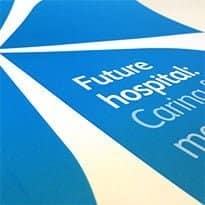RCP announces Future Hospital sites
- 26 September 2014

The Royal College of Physicians has announced that four trusts will take forward the ideas of its Future Hospital report, which called for a significant shift in the way that medical patients are managed in and out of hospital.
The trusts – one in Wales and three in England – will look at different aspects of the report, with a specific focus on how to improve the care of frail elderly patients.
The Future Hospital report was released a year ago, as financial pressures on the NHS were starting to become apparent.
It worked on the premise that the health service would not be able to use large sums of money to address the demographic pressures on it, because it was unlikely to receive significant funding increases in the future.
Instead, the report argued that the relationship between hospitals and their healthcare communities should change, to improve the care offered to acutely ill patients, while making it more efficient.
It argued that hospitals should set up an acute care hub, to make sure that acutely ill patients could be assessed and stabilised by a senior physician as soon as possible, and this idea will be taken forward by Mid Yorkshire Hospitals NHS Trust.
It also argued that hospitals should set up a clinical co-ordination centre to act as the “operational command” for a new medical division, headed by a chief of medicine, that could take charge of the care of medical patients, even if they needed to be seen by other specialists.
It argued that for this to work, the division would need “detailed, real-time information on patients’ care and status” and argued that this should be held within a “single, electronic patient record” developed to the common standards that have been the focus of the RCP’s health informatics unit and its Professional Record Standards Body.
Worthing Hospital will take forward aspects of these ideas, looking at how to standardise pathways, streamline care, and make sure that patients are transferred between teams and beds as little as possible.
Other recommendations in the report included a move to seven day working, making sure that patients have a named consultant responsible for their care, and dropping the idea of ‘discharging’ patients – extending their care into the community if necessary – and working to prevent admissions.
Royal Blackburn Hospital will explore how integrated, community teams working with primary, secondary, social and mental health services can improve care for frail, older patients.
And Betsi Cadwaladr University Health Board in Wales will look at how to bring specialist care within easier reach of frail, elderly patients living a long way from hospital, principally through the use of telemedicine.
Dr Anita Donley, chair of the Future Hospital project board, and the RCP’s clinical vice-president said: “We promised that the Future Hospital report wouldn’t languish on the shelf… and we are delighted to welcome the first four development sites to the programme.
“Together, we are harnessing the enthusiasm and willingness of NHS trusts to innovate where it matters – in improving direct patient care.”
Taking forward the ideas in the report is one of five recommendations that the RCP has made to political parties as the party conference season gets underway ahead of the May general election.
Its other points include removing “financial and structural barriers” to joined up care, investing in better care, taking a harder look at what works in the NHS and what doesn’t, and promoting public health.
The RCP is a member of the 2015 Challenge, an initiative launched by the NHS Confederation, to try and encourage political parties to create the “space for change” in health and social care.
The members of the challenge, which is backed by medical bodies, charities, councils and other civic bodies, also urges politicians to be ready to back potentially unpopular decisions, where these are necessary to address the financial and quality issues facing both services.
Dr Jane Dacre, the newly elected president of the Royal College of Physicians, will be giving one of the keynote addresses to the annual conference of the CCIO Leaders Network, which is once more taking place at EHI Live.
For full details of the keynote speakers, co-located conferences, feature areas and exhibition at the show, which takes place at the NEC in Birmingham from 4-5 November, visit its website. Registration is free and open now.





